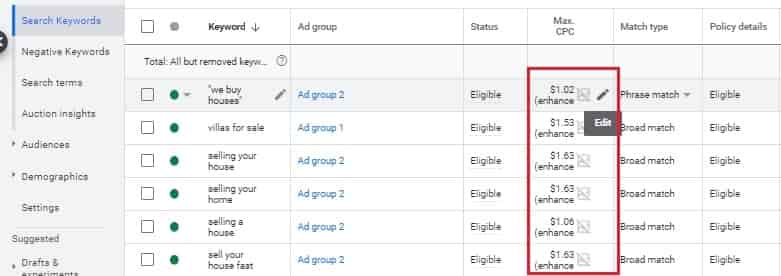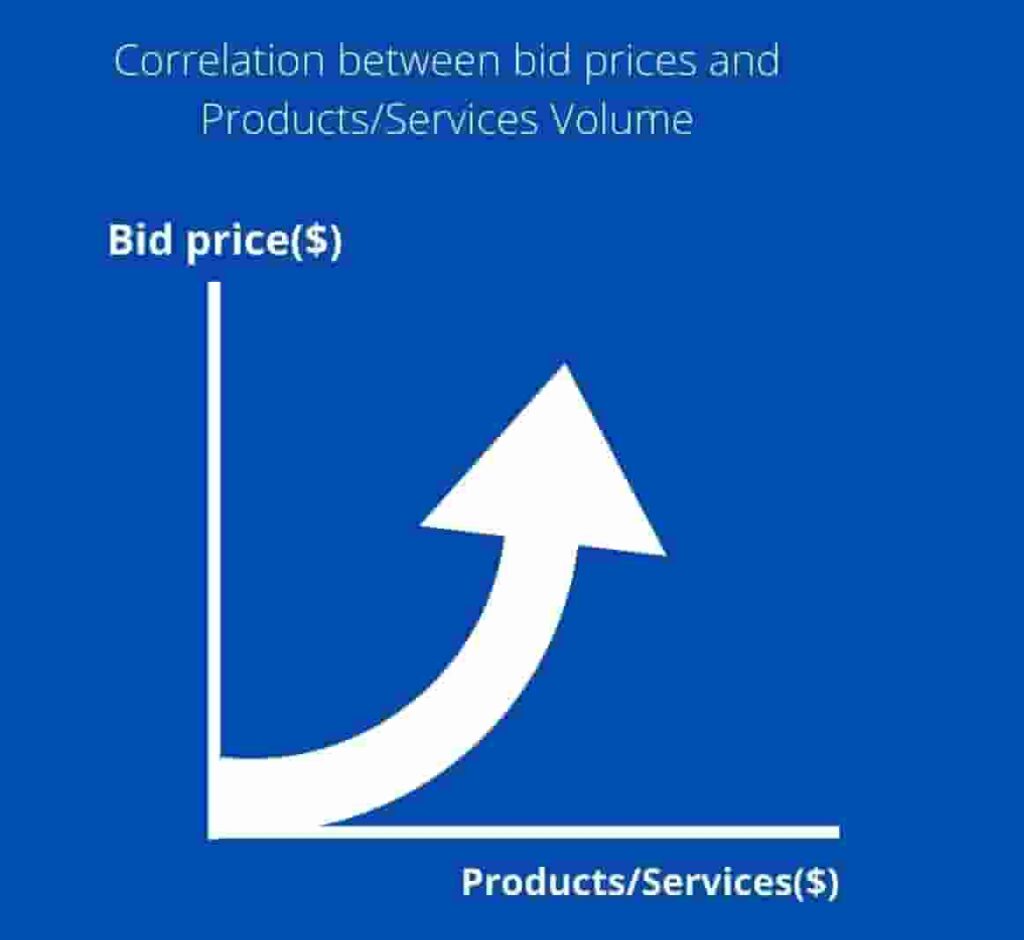Enhanced CPC Vs Maximize conversions: Similarities and Differences [In-Depth]
![Enhanced CPC Vs Maximize conversions Similarities and Differences [In-Depth]](https://wuclick.com/wp-content/uploads/2020/12/Enhanced-CPC-Vs-Maximize-conversions-Similarities-and-Differences-In-Depth.jpg)
The most crucial thing for you as a digital advertiser is to maximize your return on ad spend (ROAS).
In order to do that you can take some control yourself or trust in Google’s smart bidding tools to increase your ROI for you.
There are several smart bidding options available. But today we are going to talk about two of the most common ones.
Enhanced CPC vs Maximize conversions.
Which one is better?
To answer that question we have listed their similarities and differences.
By the end of this article, you should be able to choose the most suitable one for your business.
So let’s get started.
How do they work?
When it comes to increasing conversions and conversion value they both try to achieve that goal.
But each one has a different way.
Enhanced CPC Overview
Bidding strategies are divided into three categories: Manual, Semit-Automated, Automated.
Enhanced CPC (ECPC) is considered a semi-automated bidding strategy.
With this one, you can control your max. CPC level for each one of your keywords.

At the same time, you are giving Google Ads some level of autonomy to change those bids depending on the situation.
ECPC can focus on two types of conversions: Conversion and conversion value.

If you have a website that is trying to get as many email subscribers, leads or contact form submissions, you can focus on the conversion.
On the other hand, if your website has different kinds of products with different prices, you can use the conversion value option.
Aside from bidding on high probability conversions, Google ads can bid more on higher-priced products compared to lower-priced ones.
For instance, you sell shoes and you set your max CPC to 0.70$.
If someone wants to buy a pair of shoes for 105$. Your ads may participate in the auction with a bid of 0.35$.
If they add 3 pairs of shoes on their cart that is worth of 525$, your CPC may be raised to 1.05$

Maximize Conversion Overview
This strategy is also used to bring you as many conversions as possible within your budget.
The biggest difference from ECPC is, you can’t control your bid limits.
And you are giving Google full automation in spending your advertising budget.
Sometimes your conversions may go up too high or too low from what you expect.
But, generally, this strategy should work fine over time once it generates and tests enough data.
Let’s give an example:
Suppose you have a daily budget of 100$ for ad spend and the average conversion rate for the past 30 days is 30$.
Two customers made a search query of “Home appliances near me”.
From that query you couldn’t tell anything about them, right?
But, Google may have some historical data and signals that it thinks one customer is more likely to convert than the other one.
As a result, after analyzing some signals, it increases the conversion price of the first one to 65$ and reduces it for the second one to 15$.
In this way, this strategy tries to spend your full daily budget.
However, this was the basic explanation of how each strategy works.
Now, let’s move on to see their important features.
What Are Their Similar Features?
- Setting up conversion tracking. In order to use them both, you need to enable conversion tracking in your account. And you should have at least 15 to 30 conversions in your account history.
- Bidding based on importance. Google ads use conversion history to make the best decisions by learning the past performance of your ads and it tries to find similar patterns. It increases the prices in higher probability transactions and lowers them when there is less chance.
- Real-time signals. In making decisions, machine learning analyzes different auction-time signals to differentiate the quality of the traffic and in turn change the bids according to those metrics. Signals can include metrics like browser, location, time of the day, etc.
- Focusing on conversions. Both of their goals from running your campaigns are to increase your conversion or conversion value. However, there is no guarantee that they will be able to do it.
- Profit margins might be reduced. Even if they try to optimize your ROI, sometimes your profit margins might be reduced dramatically and even you might make a loss. Mostly this happens when the AI bids higher than the average on high probability conversions.
 From the picture, you can see that higher advertising cost is eating the profit and eventually bringing loss.
From the picture, you can see that higher advertising cost is eating the profit and eventually bringing loss.
What are their benefits and drawbacks?
Enhanced CPC Benefits
- Understanding the system. By doing some of the works manually you can gain some knowledge of how the system works rather than giving all the work to Google.
- Controlling CPC. You can gain control over your maximum CPC limits. Once you set them, the algorithm tries to bring the average price of all the bids close to your set price.
- Bid setting in bulk. In addition to changing your bids at the keyword level, you can change them at the ad group level to save some time. You can select any ad group you want and set the max. CPC.

- Two options to focus on. You can focus on two types of results: First, to increase conversions (for newsletter sign-ups, contact form submission, downloading an ebook, etc.) Second, to increase conversion value (to bid higher on higher-priced products).
- Used before shifting to other methods. This strategy can be used initially to generate more data and learn the automation before switching to more sophisticated smart bidding strategies like target CPA and target ROAS.
- Good for e-commerce or the travel industry. If you are running shopping or hotel campaigns, it tries to maximize conversions and at the same time tries to keep the total cost unchanged.
- No conversion tracking for Display ads. For display campaigns, you don’t have to set up conversion tracking to use this strategy. But your daily ad spend might increase a little bit because it tries to get the quality traffic and as a result increases the bids.
- More bid adjustments. When you want to make your own bid adjustments, your changes can be made on top of Google’s bid adjustments. So you have more control here compared to other bidding systems, which only allow changing mobile adjustments.
Enhanced CPC Drawbacks
- More workload. If you have a lot of keywords, you need to put them appropriate max. CPC depending on their competition level that means making keyword research. That itself takes a lot of work and time.
- Increases in bid prices. Bids may exceed your max. CPC level even if Google says it is temporarily. Until June 2017 prices could rise up to 30 percent. Now, that cap has been removed and there is no limit on that.
- Inefficient with more data. When you have a low conversion volume then it is a good strategy to use. Otherwise, if you have more than 30 conversions within the last 30 days, you can use other automated bidding systems, because it becomes a little harder to manage and analyze that much data.
- Not available for Display, Video, App campaigns. ECPC conversion value is available only for search and shopping campaigns for now.
- Fewer factors considered. According to Google, it uses some important auction-time signals for adjusting bids. But, it doesn’t use all the signals that other smart bidding strategies use. So, your traffic quality might not be the best one.
- No portfolio bidding. You can’t add enhanced CPC as a portfolio bid strategy to use it across multiple campaigns.
Maximize conversions benefits
- A clear-cut goal. From the beginning of a business, the metric you need to focus on is clear- Conversion. Most businesses aim to just increase it, rather than bringing this up by calculating with other ways.
- Less workforce. Less workload is required, as you don’t have to spend time on things like setting your CPC limits.
- Uses more signals. Fully automated AI that uses much more sophisticated auction-time signals in the bidding process.
- Get to know the prices. If you don’t have an idea about the cost-per-conversion, you can start running them and learn along the way, before switching to target CPA.
- Works great with high volume. Unlike the ECPC, you can use it with a lot of volumes. And the higher the volume, the better the quality of your ads may get overtime.
- Multiple campaigns. It can be used as a portfolio strategy across multiple campaigns.
Maximize conversions drawbacks
- Less control. You have very limited control over almost everything. Bid adjustments can only be made as – 100 percent for mobile devices. And whatever bid adjustments you make, it won’t be applied anyway.
- More data needed. You need to have at least 30 conversions within a month to operate effectively. Sometimes, in the beginning, it is fine to lose here and there because the system might be learning the process. That’s why if you have a higher conversion volume you can get better results faster.
- Sudden price increases. There are also times that the conversion price might get 3 or 4 times more expensive than the average conversion value.
Which one is better?
It depends on whether you want to put your bid limits yourself or you want to put your trust in machine learning to do it.
From the comparison above, we can conclude that, if you have very high knowledge of setting the correct bid limit for keywords and have time to analyze a long list of them then ECPC might be a good option for you.
On the other hand, if you don’t want to run manual tests and trust solely in Google’s AI to bring you the best conversion prices possible, then you can go for a maximize conversion strategy.
But, as you gain more and more knowledge, you should think about gradually switching from manual bidding to fully automated bidding strategies to achieve the best performance at Google ads with the least amount of effort.
Conclusion
Both of them can work greatly. It just depends on who is using it.
Give yourself some of these questions before starting any one of them.
How much monthly traffic you are expecting to receive?
Do you want to do any keyword research?
Which strategy you think can be most suitable for your business?
If you have any questions or comments you can ask them in the comments section below…
If you need any help in your digital advertising, you can reach out to us through our Contact us page.

